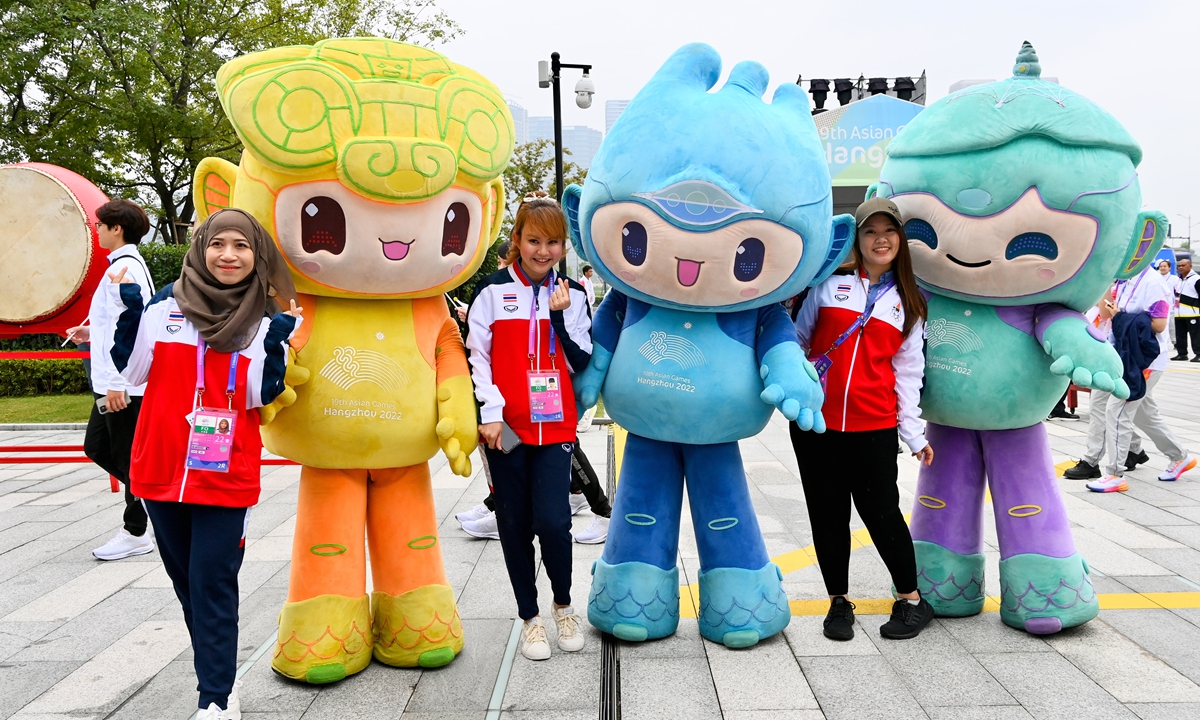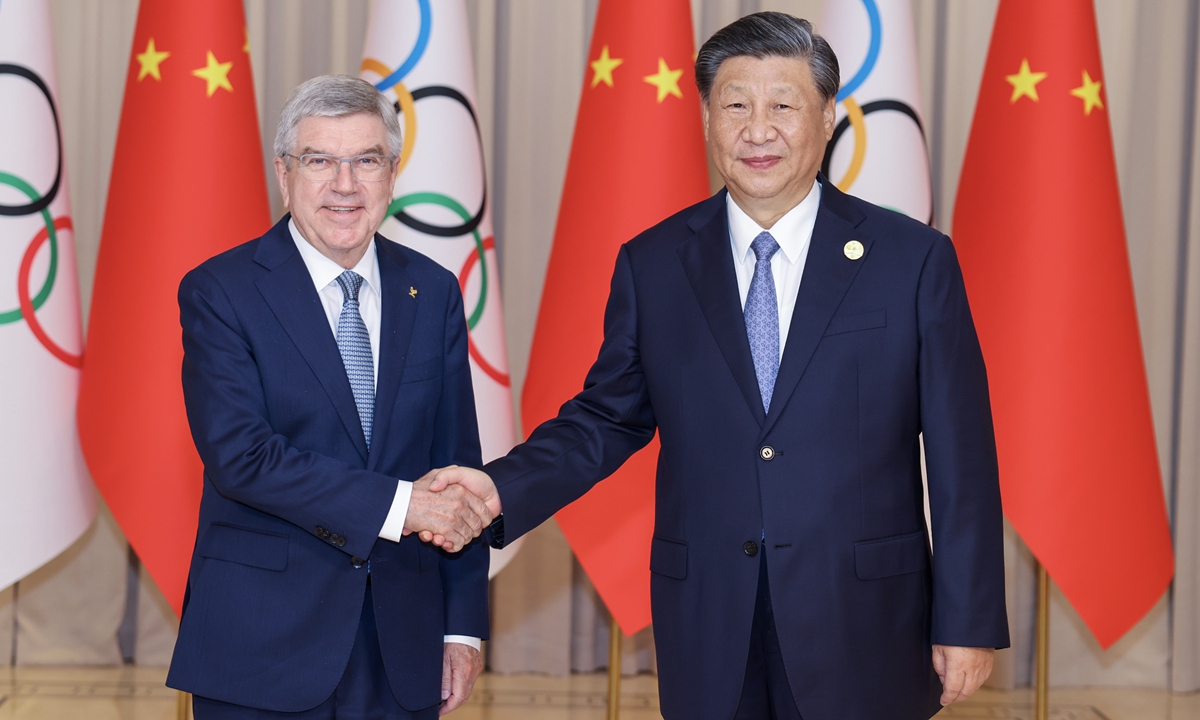
Members of the Thai delegation pose with the Hangzhou Asian Games mascot dolls at the Asian Games Athletes' Village on September 22, 2023 in Hangzhou, East China's Zhejiang Province. On the day, the organizers held a welcome ceremony for the athletes at the Athletes' Village. Photo: cnsphoto
The vibe of the 19th Asian Games is growing stronger as foreign leaders, athlete delegations, and media personnel gradually arrived in East China's Hangzhou on Friday, with major diplomatic events also kicking off, less than 24 hours before the highly-anticipated opening ceremony on Saturday evening.
Analysts believed the Hangzhou Asian Games, in addition to being a significant sports event itself, is also a stage for Asian countries to enhance unity and communication. The convening of the sports extravaganza and multiple diplomatic events highlight the current state of prosperity and stability in Asia.
About 12,000 athletes from 45 countries and regions will be welcomed on Saturday's opening ceremony, making it the largest Asian Games ever.
Chen Weiqiang, a spokesperson for the Hangzhou Asian Games, said at a press briefing on Friday that more than 10,000 journalists will cover the grand event in Hangzhou, adding that the opening ceremony performance will be a splendid one. Through three chapters, the performance will showcase China's cultural integration with Asia and the world, and the deep friendship of Asian people.
Chinese President Xi Jinping on Friday met with Syrian President Bashar al-Assad, and
Crown Prince of Kuwait Sheikh Mishal Al-Ahmad Al-Jaber Al-Sabah, as well as International Olympic Committee (IOC) President Thomas Bach and Acting President of the Olympic Council of Asia Raja Randhir Singh in Hangzhou, expressing a warm welcome to them.
All the preparations for the 19th Asian Games are ready. The Chinese government and people are fully confident in presenting a spectacular Asiad, and contributing to the development of the Olympic movement and the unity and friendship of the Asian people, Xi said.
According to Chinese Foreign Ministry, President Xi will attend the opening ceremony of the Asian Games, and hold a welcoming banquet and bilateral events for foreign leaders attending the ceremony on Saturday.
Responding to a Global Times question about his understanding of the Hangzhou Asian Games slogan "Heart to Heart, @future" at a press briefing on Friday in Hangzhou,
Singh said the slogan conveys the message that everything should be heartwarming and forward looking, and is a call to the world for peace and harmony.
Impressed by China's preparations and hosting, Singh said the Hangzhou Asian Games conveys the concept that "Asia is strong, Asia is one," and this idea and power will also affect the world.

Chinese President Xi Jinping meets with International Olympic Committee (IOC) President Thomas Bach in Hangzhou, capital city of East China's Zhejiang Province, on Sept. 22, 2023. Bach arrived in the scenic city to attend the opening ceremony of the 19th Asian Games to be held on September 23. Photo: Xinhua
A stage for enhancing unityPrime Minister of Nepal Pushpa Kamal Dahal also emphasized the importance of unity. In a recent interview with Xinhua before his official visit to China, the Nepali Prime Minister said he believes the Asian Games will create a very positive and conducive atmosphere for the unity of Asian people.
"While Asia is rising, we must uphold Asian unity, we must connect our people heart to heart for the shared and sustained prosperity," the Nepali Prime Minister said.
The first Asian Games was held in 1951 in India. Wang Dazhao, a Beijing-based sports commentator, told the Global Times on Friday that the Asian Games was born after WWII, when a large group of Asian countries, which had been bullied and colonized, were seeking revitalization and real autonomy, and recognized the importance of strengthening unity and exchange. "That significance of the Asian Games remains until today," said Wang.
Some Western media outlets hyped that hosting the Asian Games "reflects misplaced priorities" when the economic and social atmosphere in China are at a low after the three-year pandemic. However, analysts believe that Western media are making a fundamental mistake due to a sour grapes mentality.
The funding for organizing the Asian Games is not something that was considered just before the opening ceremony, but from the time the bid was successful, namely 2015, when the country began working on its budget, Wang said.
It is actually a positive thing that China was still able to meet the budget for the Asian Games in Hangzhou despite the country spending a large portion of its financial resources on epidemic prevention and control over the past three years, he added.
And in fact, China is not the country that has hosted the Asian Games the most times - Thailand has hosted it four times, South Korea has hosted it three times, and Japan has hosted it twice in its historyand is the next host of the 2026 Asian Games.
At a time when some countries are having difficulties in bidding for the Asian Games due to sports, economic and international political reasons, China has built a stage of unity for Asian countries through the Games in Hangzhou, which shows that the China today is not only powerful but also trustworthy, Wang remarked.
Prelude to the 'Asian Era'Development and prosperity are not just a solo show for China, but a symphony belonging to all Asian countries, analysts said. ASEAN has been China's top trading partner for three consecutive years. In 2023, important multilateral platforms, such as the G20 Summit, and the SCO Summit were hosted in Asia.
The hosting of the Asian Games in Hangzhou is a prelude to the coming of the Asian era, highlighting the current prosperity and stability of Asia, which is also the cornerstone of global prosperity and security, Li Haidong, a professor at the China Foreign Affairs University, told the Global Times on Friday.
Leaders and senior officials of Asian countries, through the platform of the Asian Games, communicate with each other, enhance understanding and carry out various activities, which demonstrate that the Asian era is an all-round, diversified, harmonious symbiosis and co-development era, Li said.
In 1990, the world was on the eve of a dramatic change after the end of the Cold War, and in 2010, the world felt an urgent need for cooperation due to the financial crisis. The world is also at a critical juncture in 2023 when the US is creating bloc confrontation and sowing discord in the world.
Through hosting the Hangzhou Asian Games, China is upholding the banner of cooperation, equality, development, and promoting a more inclusive coexistence in the world, according to the expert.
China embraces an interconnected and truly globalized world; it hopes to permanently bridge the gap between nations and civilizations, and to promote cooperation and prosperity among different countries. At the same time, China is striving to bring more countries together to address the various challenges of global governance, Li said.





